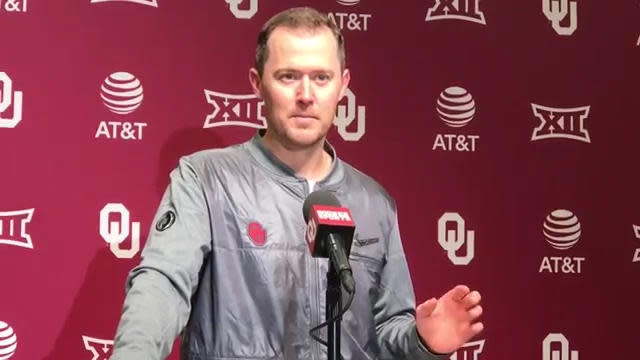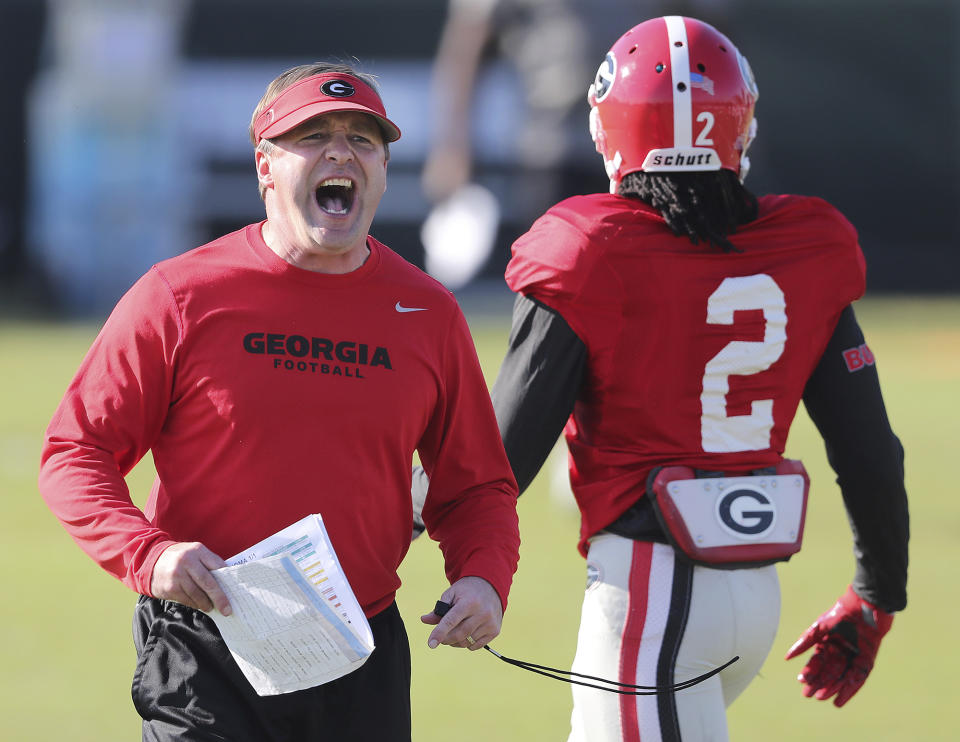Inside 2 risky decisions that shaped Oklahoma, Georgia football
LOS ANGELES – In the pre-dawn darkness of downtown Los Angeles on Thursday morning, Oklahoma athletic director Joe Castiglione settled into a booth at his favorite local diner. Before the waiter at the Original Pantry Cafe could come over and pour his first coffee, Castiglione looks over and sees a familiar face. Georgia athletic director Greg McGarity strolls in with his wife, Sheryl. The two athletic directors, both wearing school-logo pullovers, chuckle at the kismet of ending up a few booths apart while being thousands of miles from home.
In the past two years, both McGarity and Castiglione made high-stakes decisions that allowed them to cross paths in Los Angeles this week. Georgia’s hiring Kirby Smart in December of 2015 and Oklahoma promoting Lincoln Riley to head coach in June appear in retrospect to be homerun hires that could shape the sport for decades to come. With No. 2 Oklahoma playing No. 3 Georgia in the College Football Playoff semifinal at the Rose Bowl on Monday, however, it’s easy to overlook the risk and unknown that came with hiring two coaches that have elevated their team to the cusp of a national championship.
The decisions varied in scenario. Long-time Oklahoma head coach Bob Stoops stepped down unexpectedly in June, and McGarity fired Mark Richt in November of 2015 after 15 seasons and a 74 percent win percentage. They replaced the successful head coaches with promising but young assistants – Riley is 34 and Smart is 42 – with no head-coaching experience.
Fast forward to this week, and Oklahoma is poised to play for the national title for the first time since 2008. Georgia has been this close to a title only a few times since it last won the title in 1980. In separate interviews, Castiglione and McGarity sat down with Yahoo Sports on Thursday morning and reflected on bold decisions that paid immediate dividends.

– – – – – – – – – – – –
Joe Castiglione loves diners. He has a favorite one in each city. He stopped at the Original Pantry Cafe – cash-only since 1924 – a few weeks ago when Oklahoma played USC in basketball out here. (He even remembered giving a few dollars to a homeless veteran outside, and did the same upon exiting Thursday).
As he picked at eggs over easy and pancakes the size of Frisbees, Castiglione laughed when recalling his immediate reaction to Stoops telling him he’d be stepping down. “I did what any [sane]-thinking athletic director what do,” he said. “I tried to talk him out of it.” Hard to blame Castiglione for having that reaction, as Stoops went 190-48 and only four of his 18 seasons finished with single-digit victories. They’ve worked in lockstep over their time, building Oklahoma into one of the country’s most consistent powerhouses.
After mulling the decision for a few more days at Castiglione’s suggestion, they met again and Stoops hadn’t changed his mind. “There’s a difference between listening and hearing,” Castiglione said. “[The more] I listened to Bob talk about why he reached this point and feels it’s the right time, the more I heard what he was saying. He was truly at peace with the decision.”
In the days between their meetings, Castiglione researched and pondered potential replacements. But he ultimately never contacted or interviewed another candidate. When Riley arrived on campus in the spring of 2015, he made an immediate impression on the players, recruits and administration. His maturity belied his age. His energy coursed through the offense and recruiting trail. He showed a comfort level in managing experienced coaches significantly older than him.
Riley won the Frank Broyles award as the nation’s top assistant coach in 2015, as Oklahoma’s offense ranked No. 4 nationally in scoring. In 2016, quarterback Baker Mayfield and receiver Dede Westbrook finished No. 3 and No. 4 in the Heisman Trophy voting.
Interest in Riley as a head coach coincided with the success. North Texas reached out in 2015 and Houston and Oregon showed interest in 2016. As he navigated this space, he and Castiglione had several conversations about patience in making career moves, the value of where you are and where you want to end up. “I actually used Bob as a perfect example,” Castiglione said. “He was that way, too, coming out of Florida. He decided to be more selective.”
After the 2016 season, Castiglione met with Riley several times as they figured out a new contract to keep him as a coordinator. Castiglione met with his president and board of trustees to secure the additional compensation. When asked by his bosses how he saw Riley’s career arc, Castiglione said: “I could project him as the coach that replaces Bob Stoops,” he said. “Time will tell, we’ll never know. But I could project it. And everyone said, ‘We can too’. Bob did, too.”
Castiglione is a conscientious deflector, admitting there’s no science to a decision this complicated. He credits a kaleidoscope of people, starting with Stoops, for believing Riley was the right choice.
After Stoops decided he was stepping down, Castiglione met with Riley and they went through a formal interview. Riley did the same with Oklahoma president David Boren. They declined to speak with anyone else. “My gut feeling,” Castiglione said. “I know you want a lot more description than that. I don’t think I’m alone in that [feeling]. I trusted everyone’s gut.”
– – – – – – – – – – – –Kirby Smart didn’t show up to his Georgia interview until after 10 p.m. on a Saturday night, but he had a good excuse. He’d spent most of that December day in 2015 helping Alabama secure another SEC title as the Tide’s defensive coordinator.
McGarity interviewed others for the Georgia job, but Smart began and ended the search as his top target. In all reality, even though they’d never met, the deal had been done for days. McGarity acknowledges with a chuckle the stakes of his blind date with Smart that night. Georgia hadn’t won the SEC since 2005, and needed someone to lead it back there. “We needed someone,” he said, “to tell us what it means to go big.”

Smart grew up as the son of a high school coach in Georgia, starred there as a player and did two stints on the football staff. And when he arrived at the interview with his agent, Jimmy Sexton, he laid his vision for exactly how Georgia could go big: “We had operated under one way for seven years,” McGarity said. “I don’t think anyone knew how [to go big], not to be negative towards anything [former coach] Mark [Richt] did, but he was pretty set in his ways. The part important to us is we needed help understanding what do we need to do.”
Richt’s 15-year stretch at Georgia proved successful by most conventional metrics. Along with winning 74 percent of his games, Richt had a solid reputation in both the local and football community as a classy citizen.
Finding a replacement to win at a better clip wasn’t simple. “Those decisions are so hard because they affect so many people and can’t be done lightly,” McGarity said. “If you start thinking of the impact and risk, you get overwhelmed.” Everything for McGarity came back to a simple notion: “Are you okay with being just good? I don’t think that’s the vision for Georgia.”
Georgia recruited well, produced a churn of NFL draft picks and were competitive. But McGarity saw the rise of Florida under Urban Meyer and Saban’s run of dominance at Alabama and eventually got the feeling that couldn’t be duplicated at Georgia under Richt. “We have very talented teams, but it seemed like we always got to the edge, to the doorstep,” McGarity said, “and never took that step inside.”
While McGarity had never met Smart, Georgia president Jere W. Morehead had taught Smart in the school’s Terry College of Business in a Legal Environment of Business course. “He was an intense young man and very focused,” Morehead said. “He’s very smart. His name is an appropriate one.”
When Smart finally arrived at a conference room at the Renaissance Marriott at the Atlanta airport, there was an instant connection. McGarity compared it to his time as an associate athletic director at Florida when he and athletic director Jeremy Foley flew to Huntington, West Virginia, to hire then-Marshall basketball coach Billy Donovan. They interviewed him at his kitchen table, and they happily accepted the Coors Lights he offered them. “You just had a gut feeling,” he said. “You know a lot about people in the first five minutes you meet them. Everything I knew about Kirby was validated in those few minutes.”
Two gut feelings validated in the biggest way. And for Georgia and Oklahoma, this year’s College Football Playoff bids may be just the beginning.
More from Yahoo Sports:
• Obama: Eagles DT Long an ‘example of what’s best about America’
• Kevin Durant’s Defensive Player of the Year campaign picking up steam
• NFL makes concussion protocol adjustments after Tom Savage incident
• James Harden’s meltdown completes stunning Celtics rally

